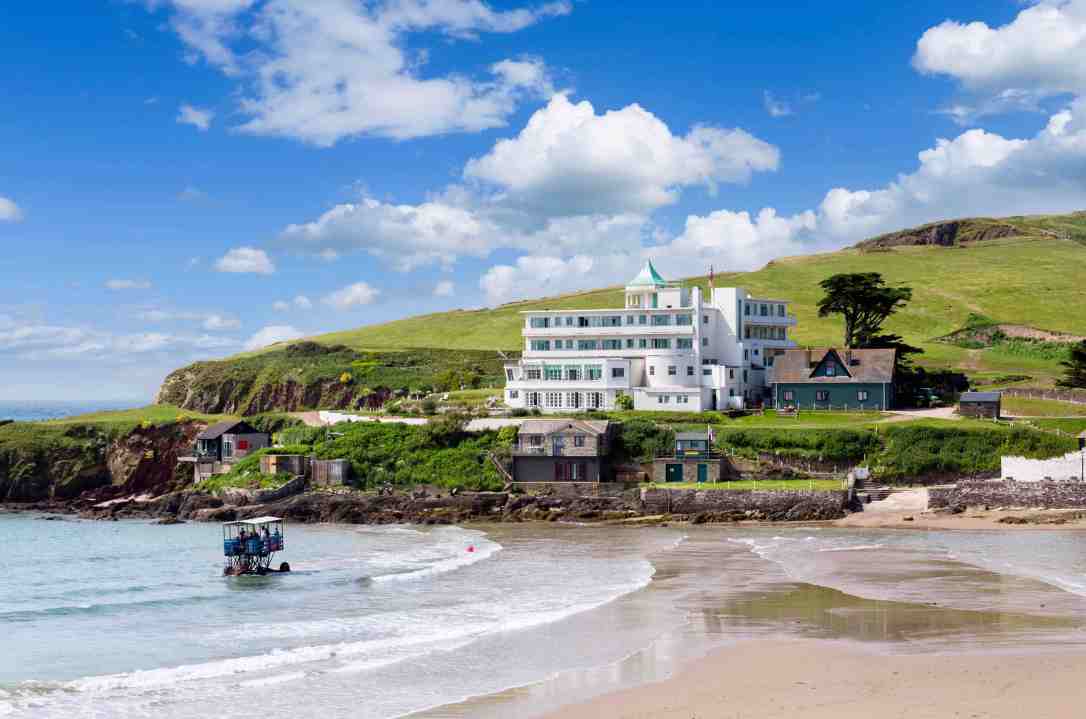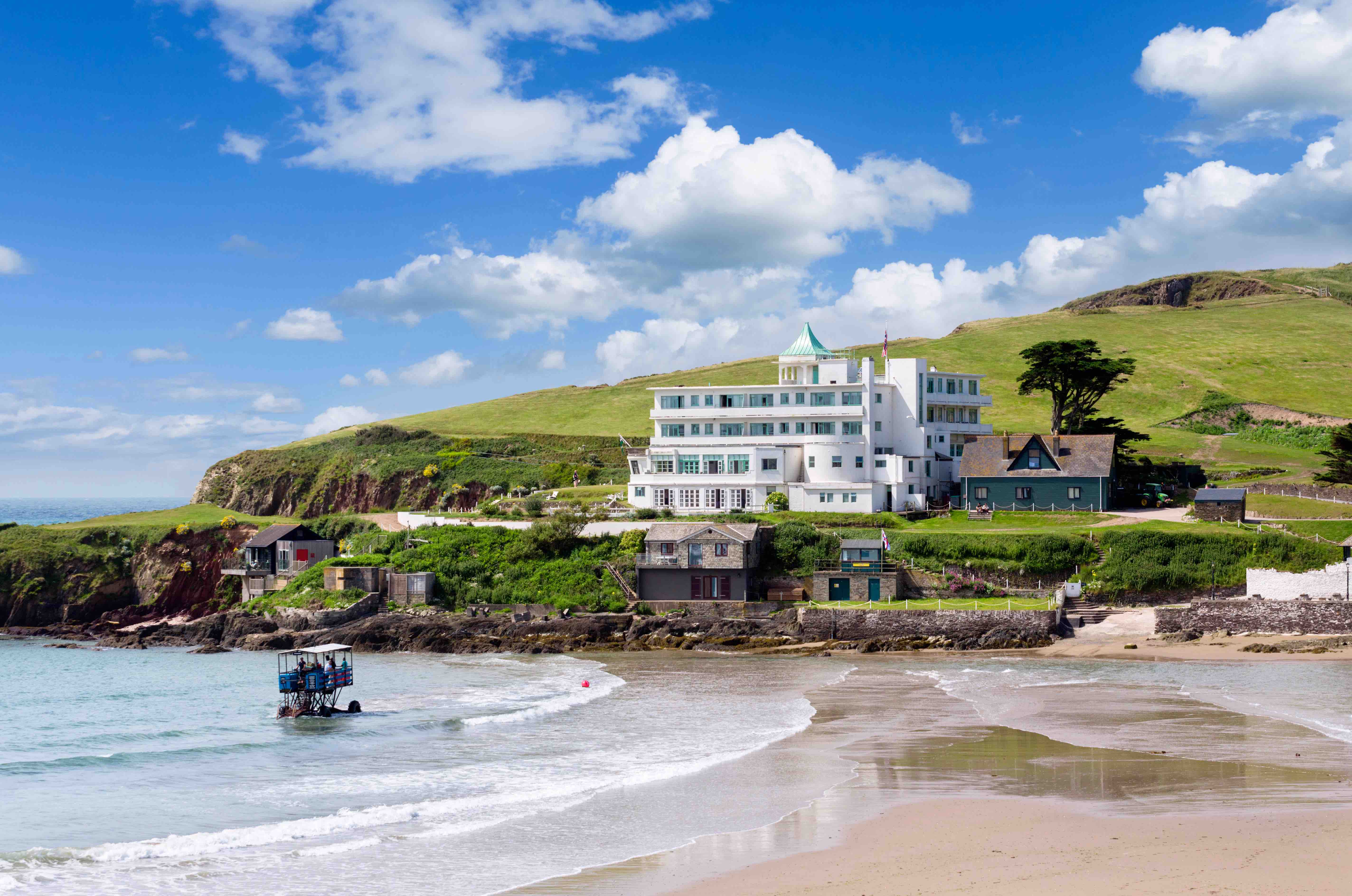The Burgh Island Hotel lives on a tidal island in a deserted part of south Devon. The directions for visiting are very detailed. You drive along the deserted country road, and at a certain point – just before you lose mobile telephone reception – you must stop to telephone the hotel, and they tell you where to park your car on the mainland, and they will send the car across the beach and meet you in Bigbury-on-Sea. You drive on and eventually you see a brightly lit Art Deco palace under a cliff. It was built by a filmmaker called Archibald Nettlefold (Human Desires, The Hellcat), the heir to an engineering fortune. I think he was a very odd man. There is very little information about him, but he left this hotel, and there is probably an old monastery underneath it.
If it were high tide, we would be brought across the back by a strange high wagon on wheels: an Edwardian-style amphibious vehicle that appears in the adaptation of Evil Under the Sun, which was filmed here. Poirot did not like it, but he wasn’t adventurous for a detective. Since it is low tide, we are driven in a 4×4 across the sand. We pass an ancient inn called The Pilchard at the entrance to the island, which may have been a hotel for pilgrims to the monastery: weekenders walk here for ale and good pies.
The Burgh Island Hotel meets my criteria for a great hotel, and this is what my love, who likes Flashman and hates people, deserves for Valentine’s Day. I lured him here with the promise of an island (a tidal island is only half island, but it is good enough). He would live in a lighthouse if he could.
It creates reverie: what is it? Why do I want to come back, stay a season, maybe die? It flew out of fiction, and back again.
I don’t like generic places because they can’t surprise you – the bed linen is soft, the water is wet – and they make you lazier and stupider, which is the opposite of travel, or should be. This one is different. It creates reverie: what is it? Why do I want to come back, stay a season, maybe die? It flew out of fiction, and back again. It is, when you stand under it, far smaller than it looked from the mainland. It is the size of a large house that realised it was popular and so grew a bit more, and, like a human being, it has photographs of itself when it was younger: it yearns for 1929, which was the year of its opening, or birth. Inside, it is a museum of Art Deco: mirrors and splinters and sunbursts and screws to honour the source of Nettlefold’s fortune. It is fiercely carpeted and heated, as if for some griping invalid, and staffed by people of amazing kindness. Outside are the remnants of an idealised childhood holiday: faded striped deckchairs, a tennis court, a croquet lawn, a swimming hole under the cliffs.
Burgh Island feels like a mystery that cannot be solved, and there is a reason for it. The hotel has a patron writer: Agatha Christie. She set two novels here – Evil Under the Sun and And Then There Were None. You can stay in her studio on the water, though I wouldn’t. Christie’s ghost, filled with stories of poisonings and garrottings and domestic hatred, disturbs me. As guests we follow the timetable of her literary characters (she just wrote and ate cream at her desk), which makes me wonder if we are all re-enacting a Christie novel, or solitary parts of one. Of course, we are, and that is what is addictive about it: we are playing in the Palm Court, and the Grand Ballroom, and on the cliffs. The Nettlefold restaurant has the captain’s cabin of the HMS Ganges – the last wooden warship in the Royal Navy – attached to it as an afterthought, or joke.
I sit in the lobby covering multiple lines of sight, which is a great deal more fun than it sounds. The staff greet me kindly every time they pass: they know I am busy not being murdered. When I am bored there is a suite upstairs with a view of the mainland, a long balcony, and a vast bed. It is surprisingly restful, but the English have long repurposed the idea of murder as relaxation. I suspect it has something to do with the repression of our feelings: stiff upper lip, and a knife in the guts.
The following morning, we walk across the island. It doesn’t take long because it is tiny: even St Michael’s Mount dwarfs it. There is a steep walk behind the hotel, and then a sharp drop to the sea: Christie’s Pixie Cove, where Arlene was strangled for her money. If you did this at night you would kill yourself, and I wonder if that is what appealed to Christie and to us too: comfort and the potential of death. We are on holiday in the south of England. What else is there?
Bed and breakfast doubles at Burgh Island Hotel start from £485 per night at low season.







Comments